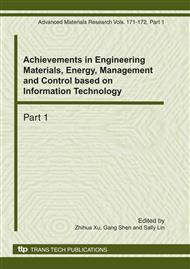p.136
p.140
p.144
p.150
p.154
p.159
p.163
p.167
p.171
A Quick Attribution Reduction Algorithm Based on Incomplete Decision Table
Abstract:
At present, some scholars have provided the attribution reduction algorithms of incomplete decision table. The time complexity of many algorithms are .To cut down the time complexity of the algorithms for computing attribution reduction , the definition of discernibility matrix based on positive region and the corresponding definition of the attribution reduction are provided. At the same time, it is proved that the attribution reduction is equivalent to the attribution reduction based on the positive region. The discernibility matrix is simplified for not comparing the objects between .On this condition, a efficient algorithm for computing attribution reduction is designed with the simplified discernibility matrix, whose time complexity is .At last, an emulate example is used to illustrate the efficiency of the new algorithm.
Info:
Periodical:
Pages:
154-158
Citation:
Online since:
December 2010
Authors:
Price:
Сopyright:
© 2011 Trans Tech Publications Ltd. All Rights Reserved
Share:
Citation:


